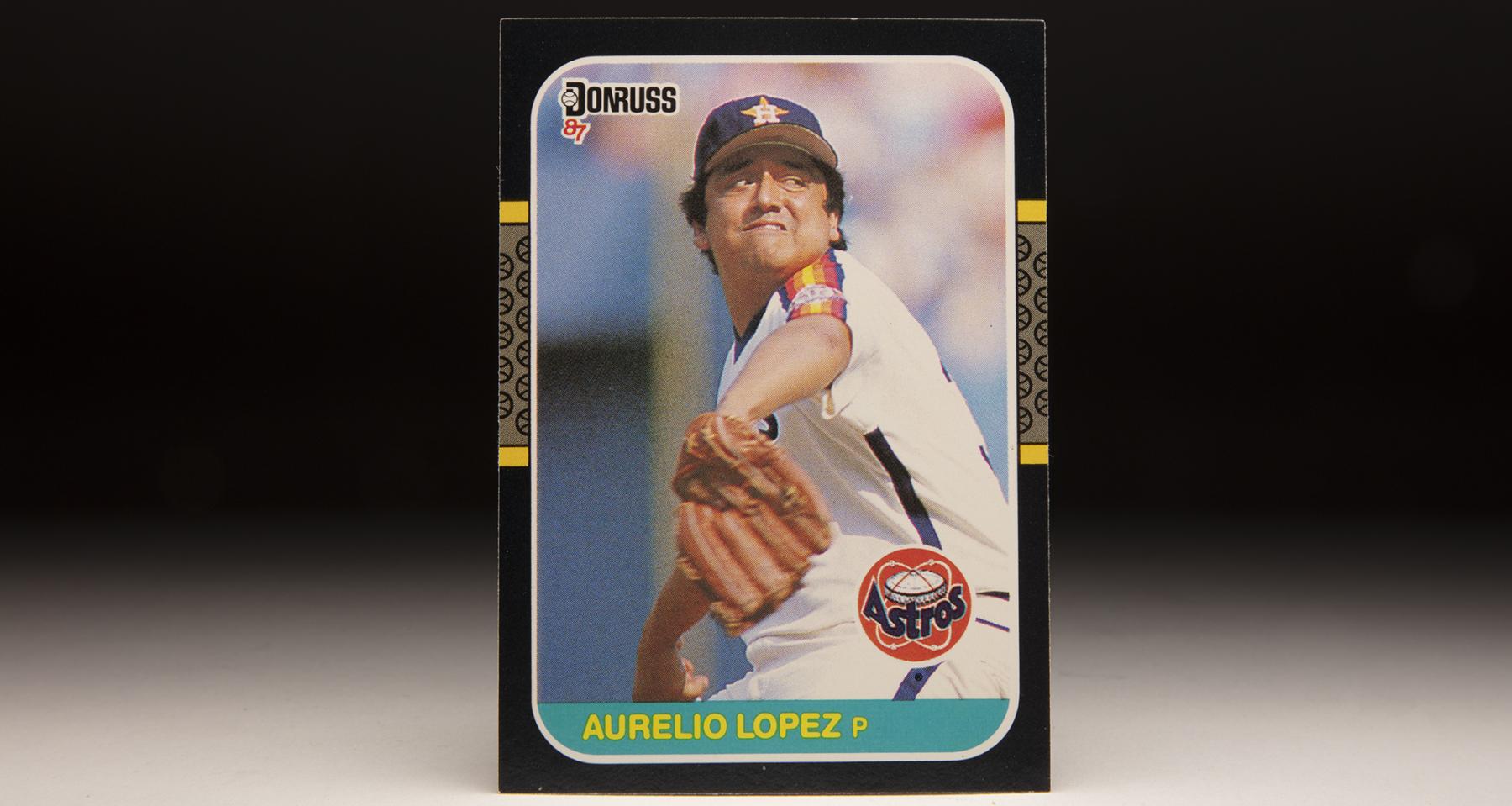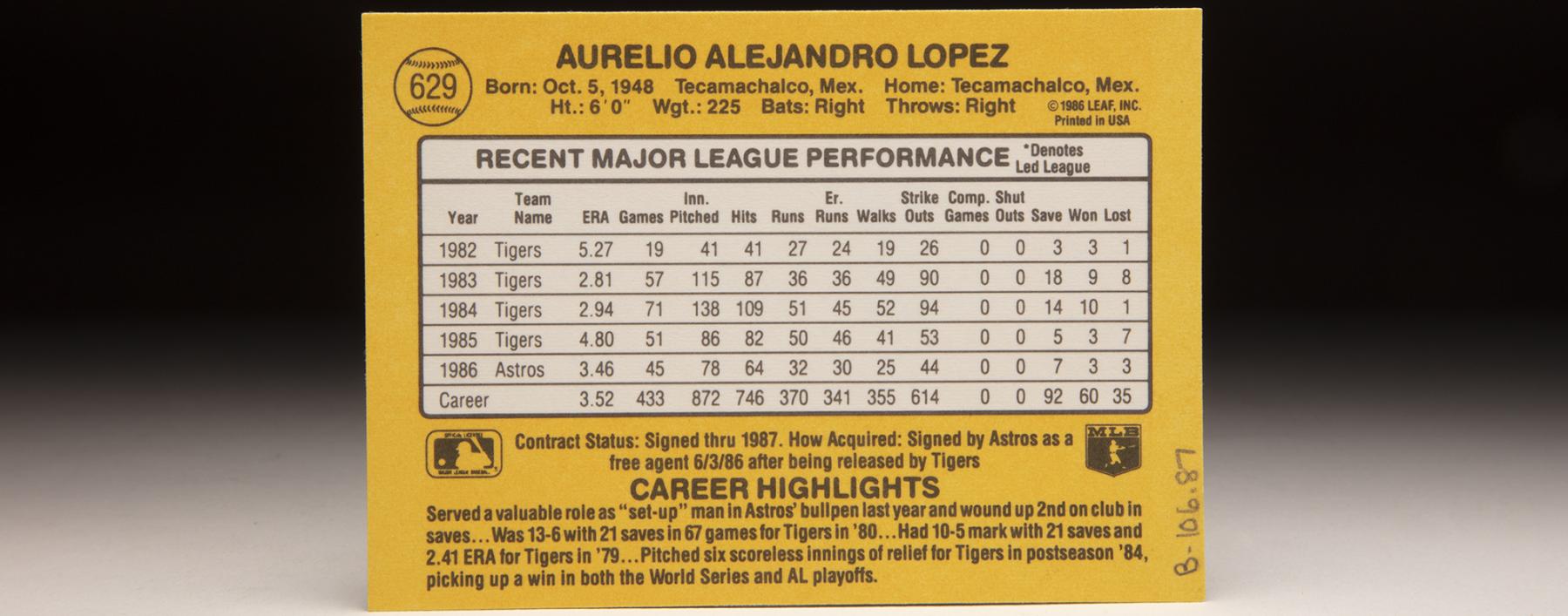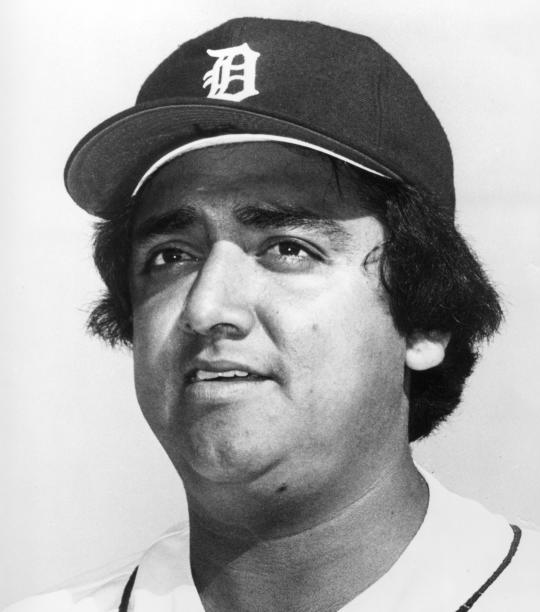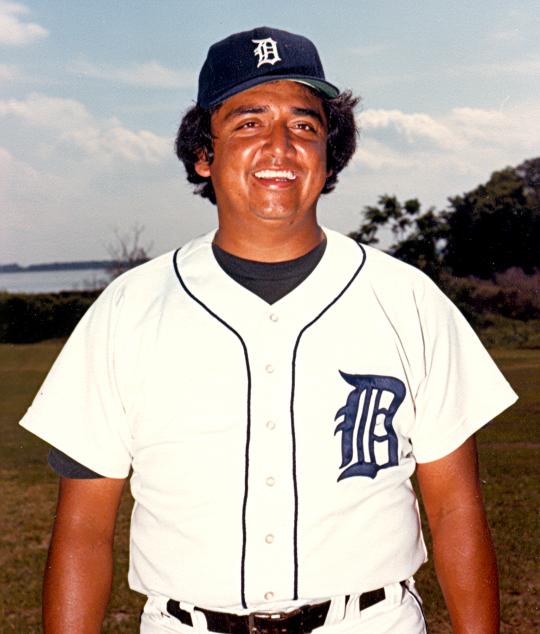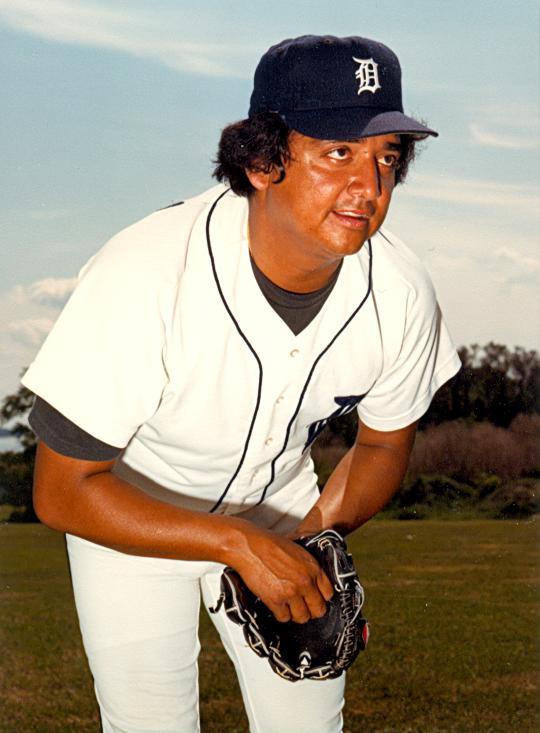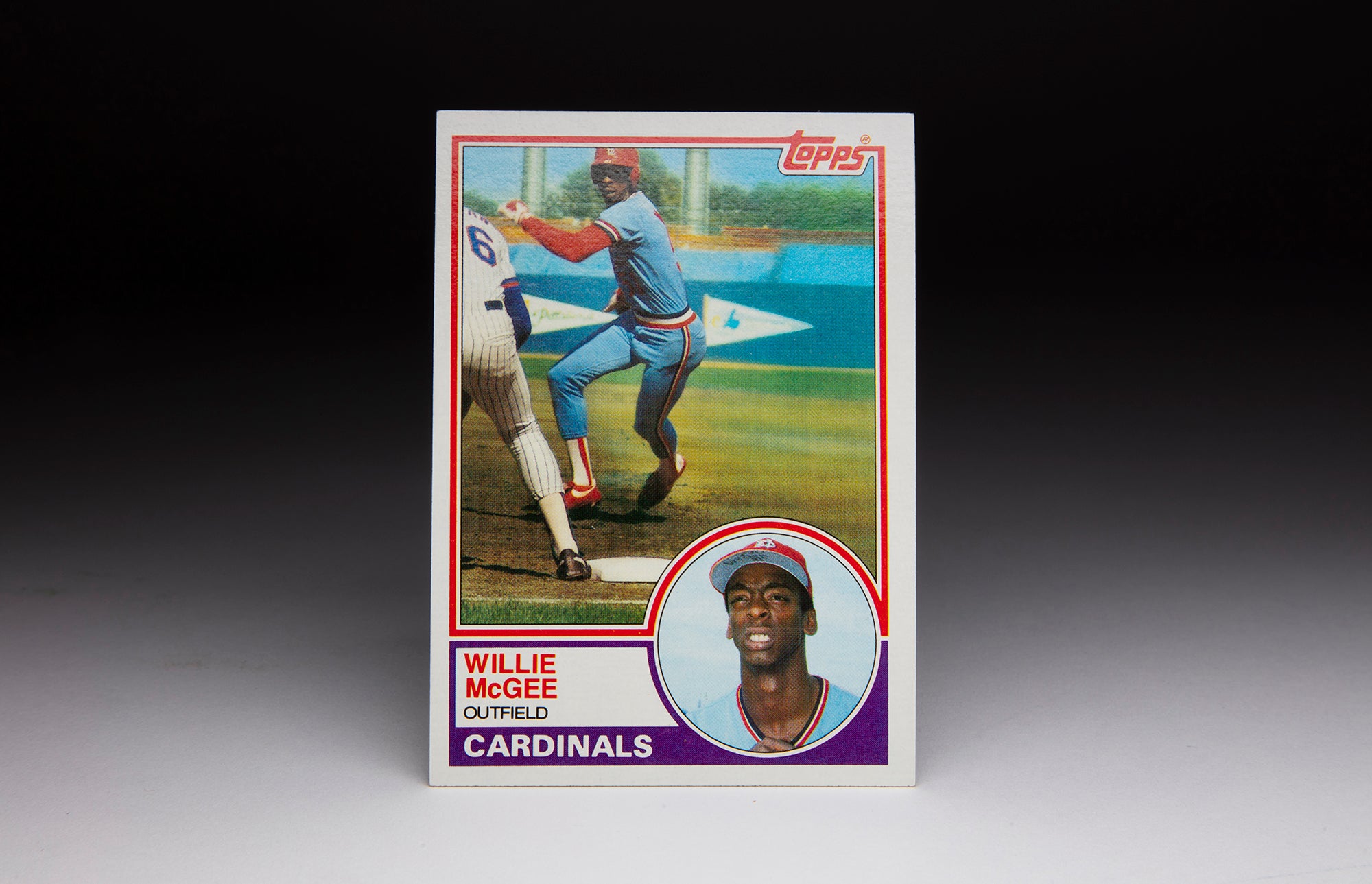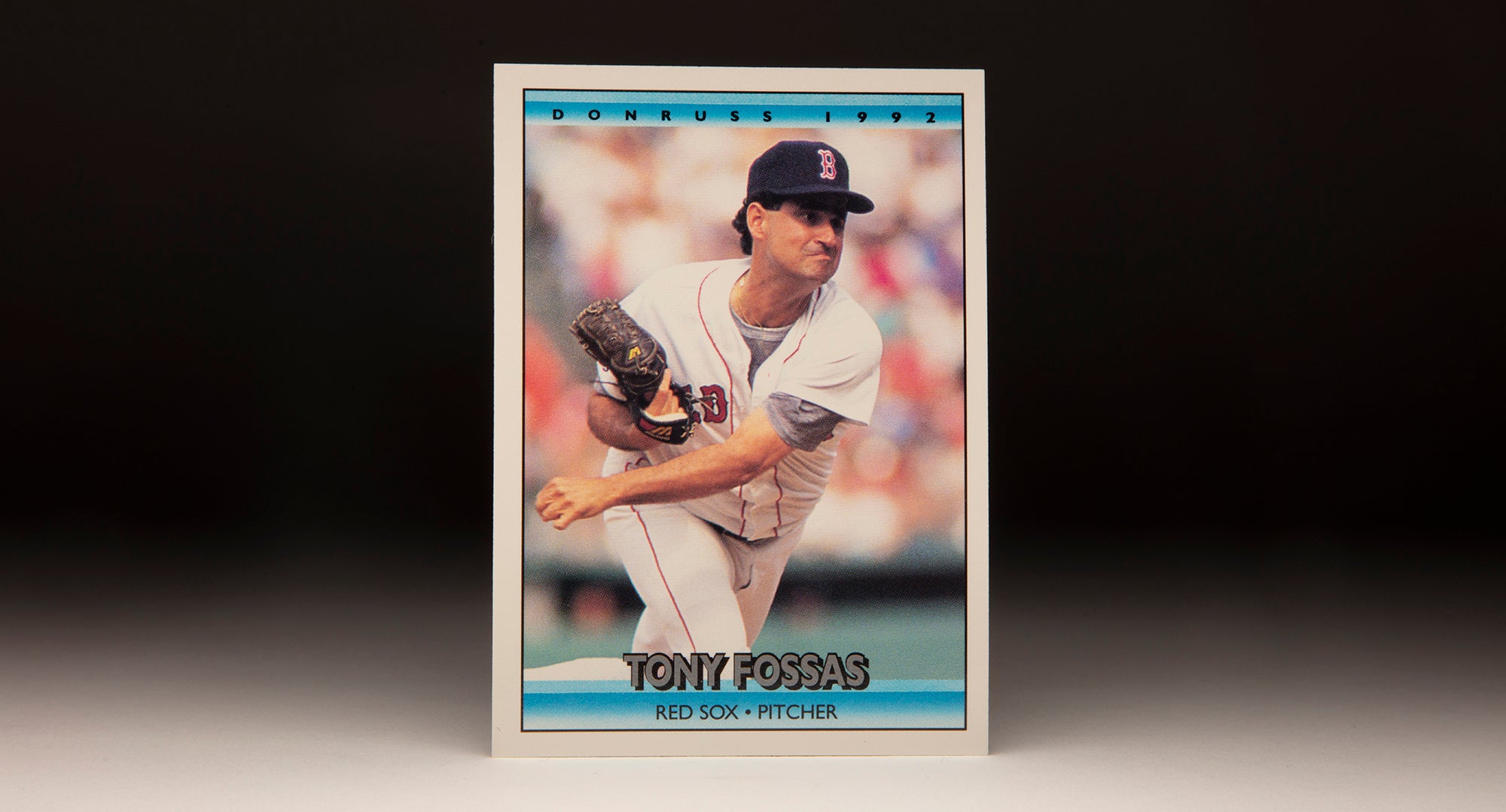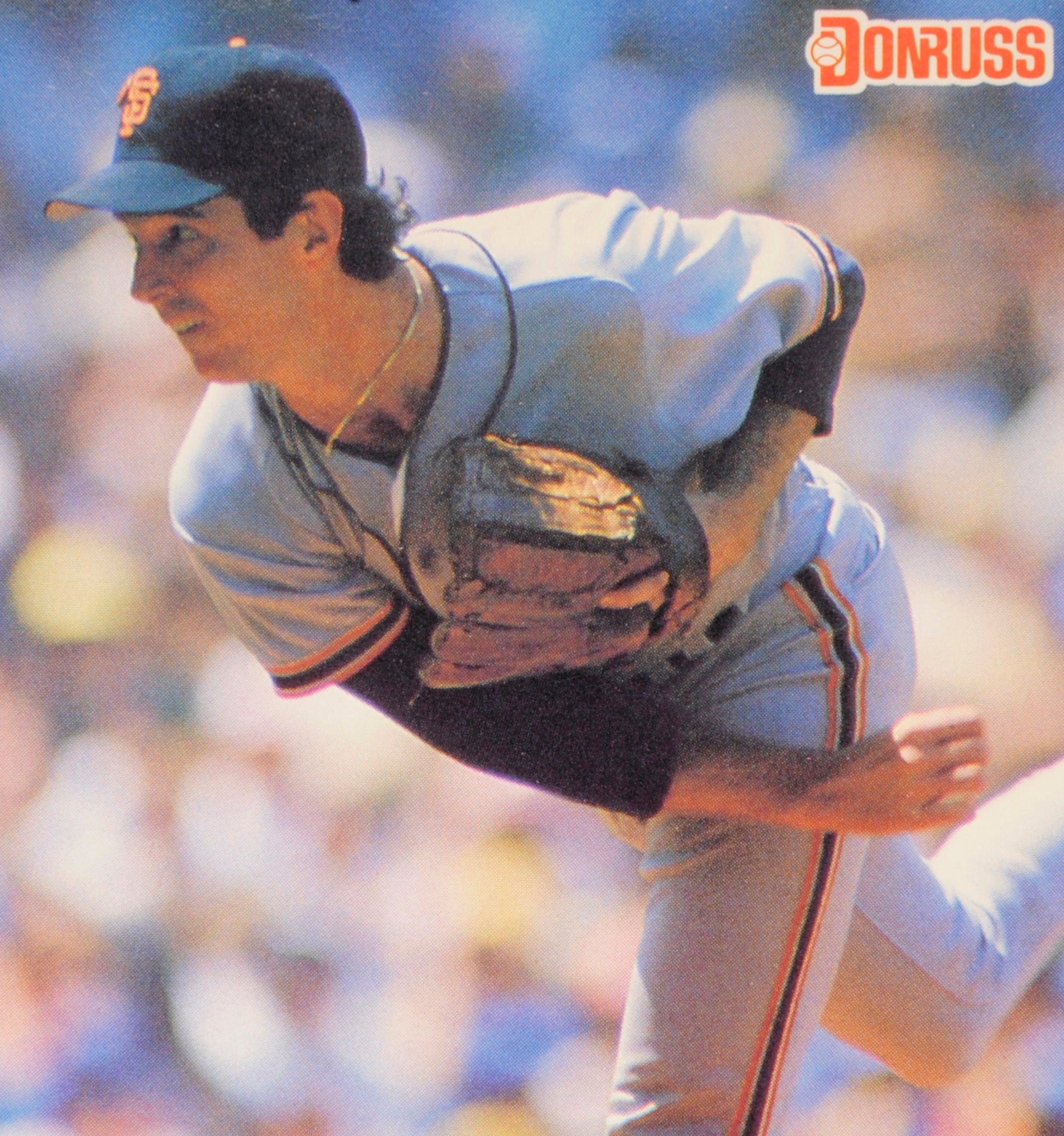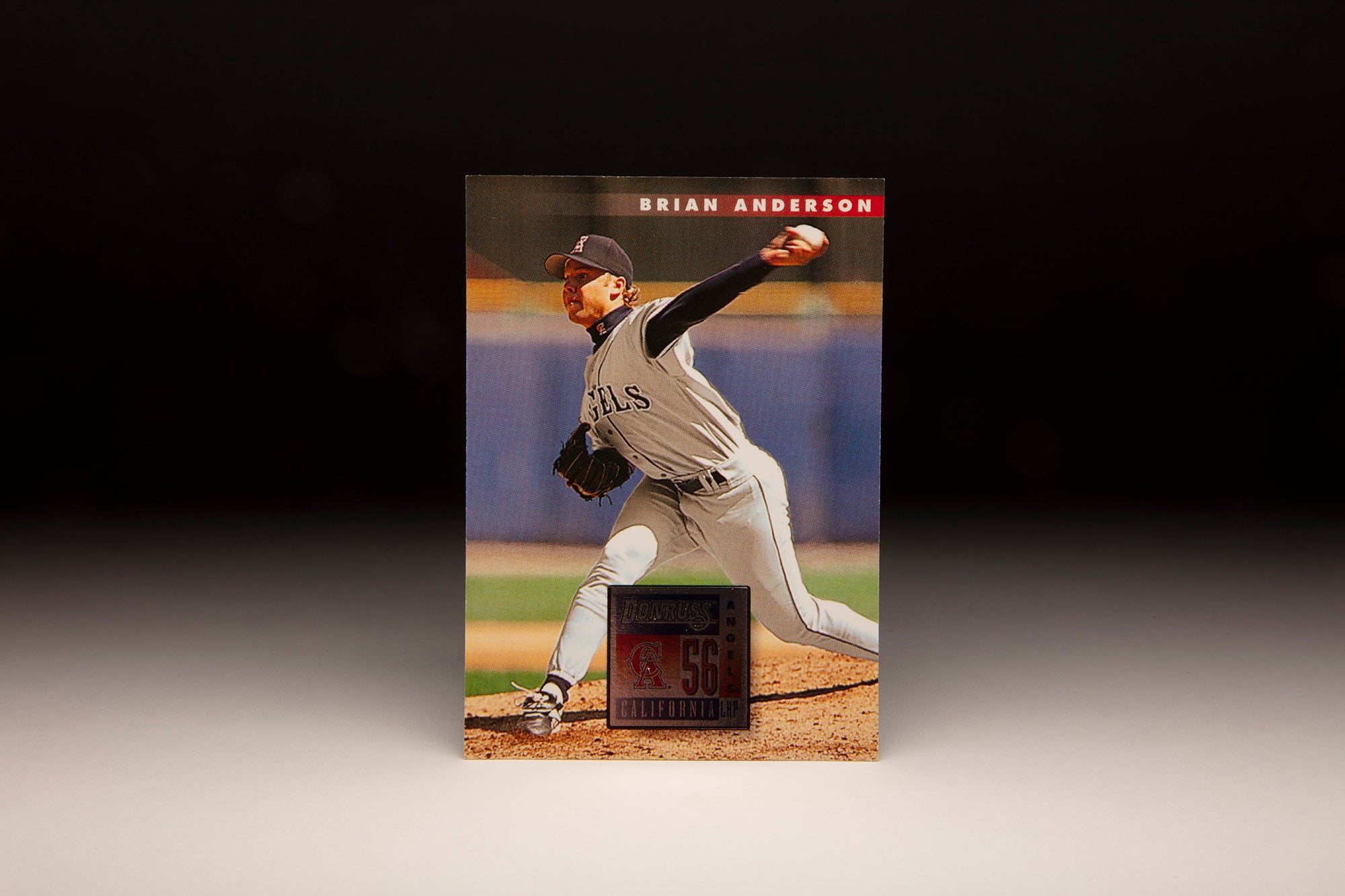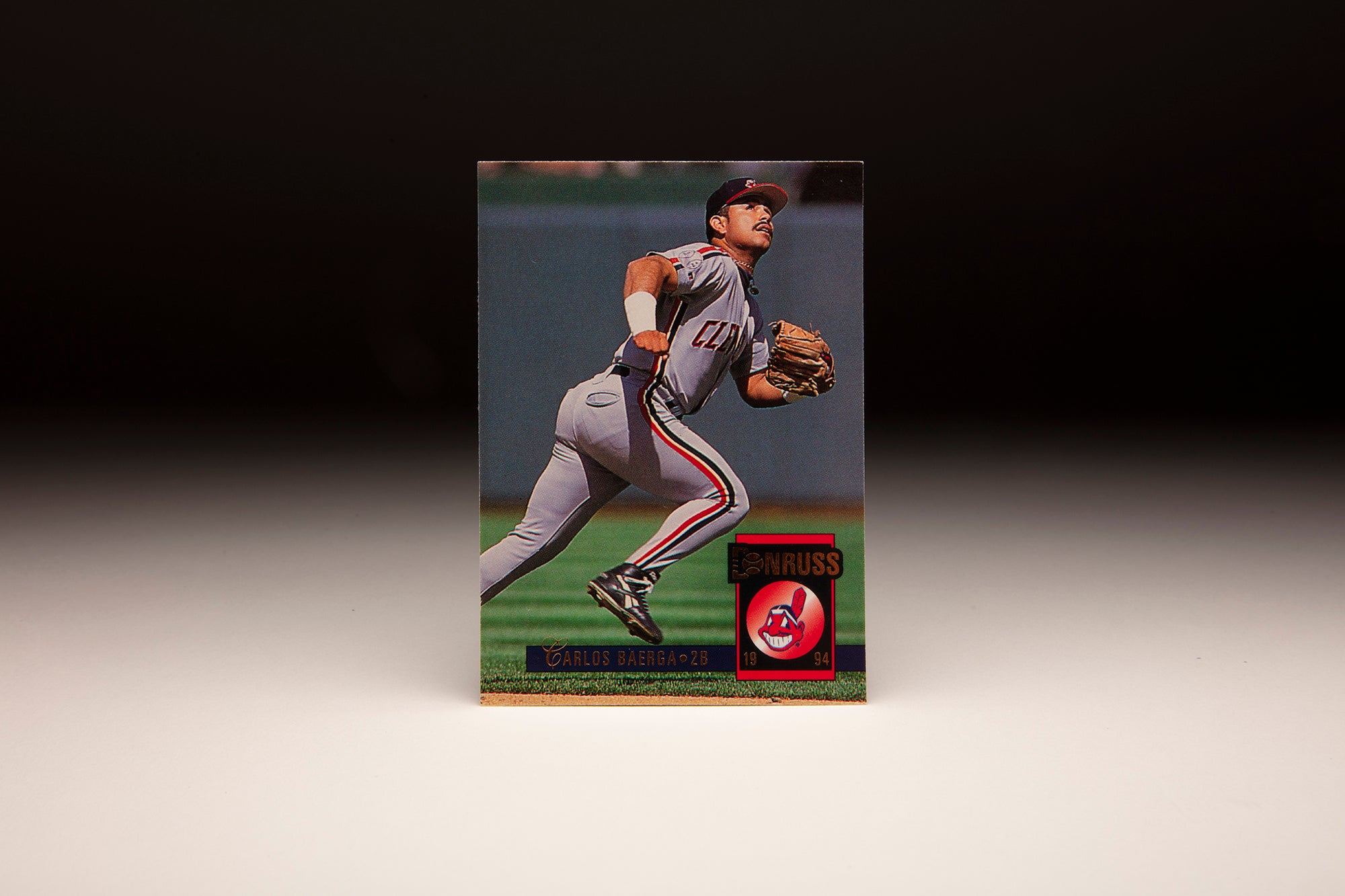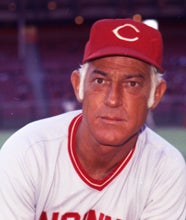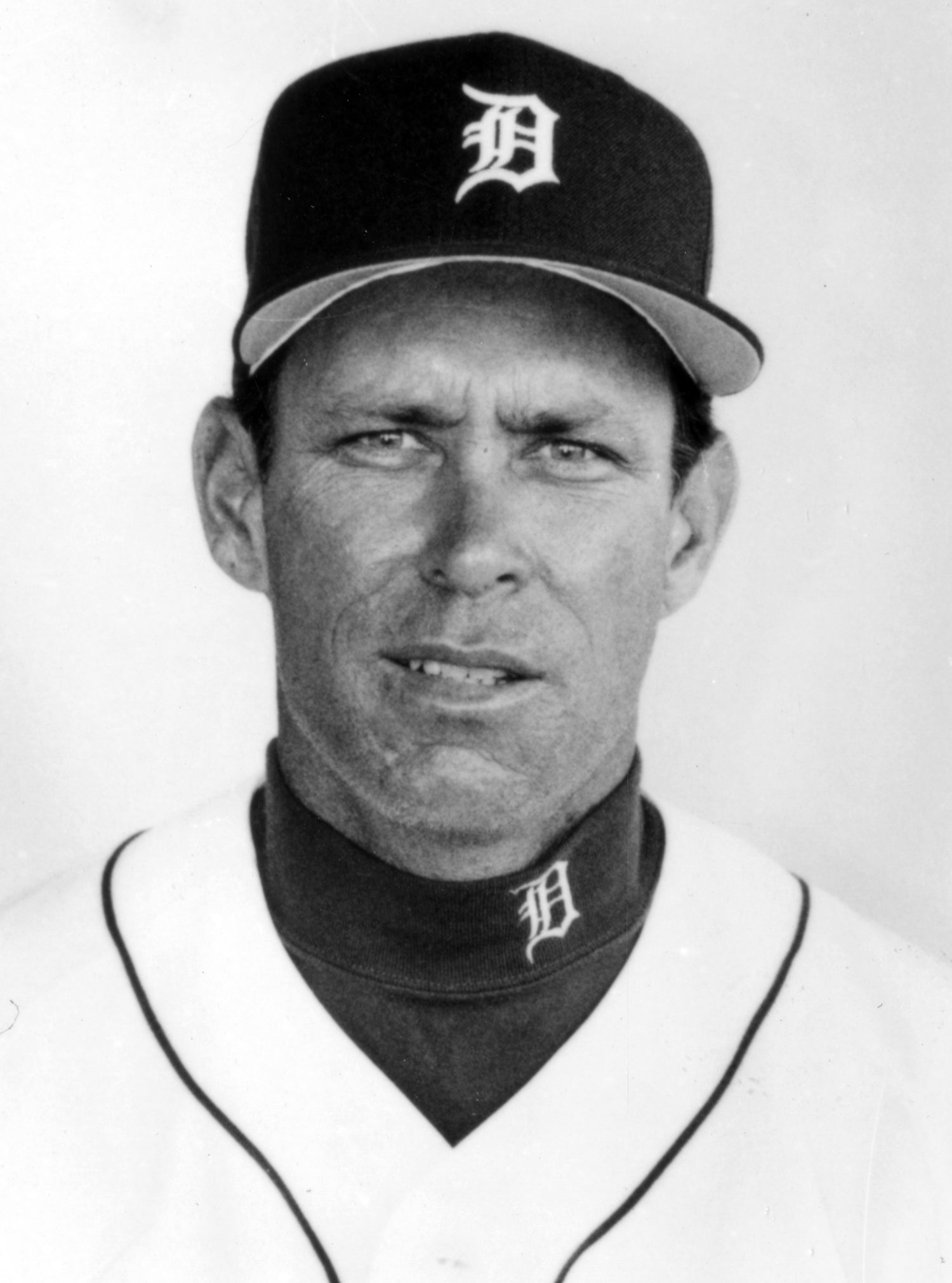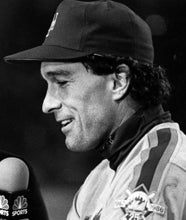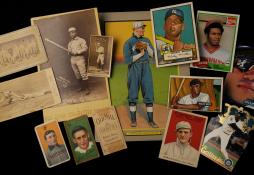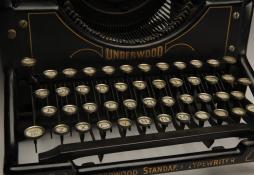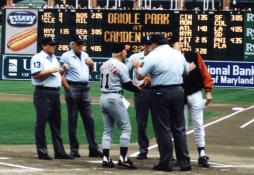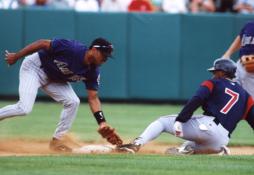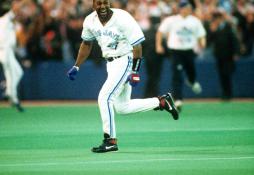- Home
- Our Stories
- #CardCorner: 1987 Donruss Aurelio López
#CardCorner: 1987 Donruss Aurelio López
He recorded the victory to cap off the Tigers’ 1984 World Series-winning season, took the loss two years later in one of the most famous postseason games ever played and earned one of the best nicknames of his era with a rare-back-and-throw-it fastball.
Señor Smoke, Aurelio López, saw it all in a career that began in the Mexican League and lasted 11 years in the majors.
Born Sept. 21, 1948, in Tecamachalco, Mexico – about an hour southeast of Mexico City – López was the son of a heavy equipment operator who learned to play baseball in the courtyard of the town’s 16th century Franciscan monastery.
By 1967, López had found his way into pro baseball in Mexico. The following year, he was pitching for the Mexico City Reds of the Mexican League, going 10-10 with a 2.61 ERA at the age of 19.
Tigers Gear
Represent the all-time greats and know your purchase plays a part in preserving baseball history.
Hall of Fame Membership
There is no simpler, and more essential, way to demonstrate your support than to sign on as a Museum Member.
López won 17 games in 1969 and 16 more in 1970 before arm problems hindered him for two seasons. He began transitioning to a relief role, however, and in 1974 he helped the Reds win the Mexican League title. Shortly thereafter, the Kansas City Royals purchased his contract and he appeared in eight games that September, posting a 5.63 ERA over 16 innings.
But at the end of Spring Training of 1975, the Royals sold his contract back to the Mexico City Reds.
Three more seasons in the Mexican League followed, and López became a national hero. In 1977, he went 19-8 with 30 saves and a 2.01 ERA in 73 games, earning the nickname The Vulture of Tecamachalco.
On Oct. 26, 1977, the Cardinals purchased López’s contract from the Reds.
“He uses so many breaking pitches that the fastball is, in effect, a change of pace when it comes,” Jim Bayens, the Cardinals’ scouting director, told the St. Louis Post-Dispatch after López took the mound for his first Spring Training action in 1978. “Because when it comes, it’s a surprise and therefore looks faster than it is.”
López, however, failed to make the Cardinals’ Opening Day roster and was sent to Triple-A Springfield. There, he went 6-6 with nine saves and a 3.55 ERA before being recalled to St. Louis, where he debuted with the Cardinals on July 17.
Over 25 appearances in July, August and September, López was 4-2 with a 4.29 ERA. Then on Dec. 4, López and Jerry Morales were sent to the Tigers in exchange for pitcher Bob Sykes and a minor leaguer.
Almost four years later, Sykes would be traded again – this time in a deal that famously sent minor leaguer Willie McGee to the Cardinals. But the López-for-Sykes deal was almost as one-sided.
The Tigers began the 1979 season 27-26 – a mark that cost manager Les Moss his job. Detroit quickly brought in Sparky Anderson, who had been dismissed by the Reds following the 1978 season despite having two World Series titles on his resume.
Given a five-year contract, Anderson set about reshaping the Tigers. One of his earliest moves was to install López – who had spent most of the season to date working in low leverage situations out of the bullpen – as his closer.
“When I took the Tiger job on June 14, I knew nothing about López,” Tigers manager Sparky Anderson told the Baltimore Evening Sun in 1979. “I talked to some of the Detroit people and they told me he hadn’t done much. He was very close to being cut.
“The turning point for López was when we were in Baltimore (the weekend of June 22) and lost those three games all in the eighth or ninth inning. I was going with Dave Tobik as my short relief man and he was having a rough time. Finally, in the fourth game of that series, I decided to bring López in.”
That day, Sunday, June 24, López worked three scoreless innings against Baltimore, striking out five batters.
“López throws the ball really hard and he has an excellent screwball,” Orioles outfielder John Lowenstein told the Evening Sun. “You know, in Mexico he’s a legend.”
López grew his legend in Detroit that summer, finishing with a 10-5 record, 21 saves and a 2.41 ERA in 61 games. He placed seventh in the AL Cy Young Award voting following the season.
Now secure in his position, López pitched in the winter league season in Mexico before reporting to Spring Training in 1980. Anderson had instructed López to report at 230 pounds or less, and López – whose weight was often an issue for the media – said he would make the target.
“I’m about 228 or 230,” López told the Detroit Free Press after reporting about 10 days late due to visa issues. “But no water tonight and no breakfast tomorrow morning.”
But the extra pounds had no effect on López’s performance. In 67 games in 1980, López was 13-6 with 21 saves and a 3.77 ERA. He made a reported $90,000 in 1980, then signed a one-year deal worth a reported $250,000 in January of 1981.
A slump by López in early 1981, however, prompted Anderson to move Kevin Saucier into the closer role. Lopez finished the strike-shortened season with a 5-2 record and three saves in 29 appearances. He then battled shoulder problems in 1982 that saw him start the season on the injured list and endure a demotion to Triple-A Evansville during the season, finishing with a 3-1 record, three saves and a 5.27 ERA in 19 games for Detroit.
On Sept. 20, 1982, López informed the Tigers he was leaving the club in order to return to Mexico.
“My problems are personal,” López said in a letter to the Tigers. “They revolve around my family, my boys’ schooling and the Mexican economy.”
But López soon changed his mind and reported to Spring Training in 1983 looking like his former self – despite rejecting the Tigers’ offer of a $280,000 salary, the same money he made in 1982, and then losing his arbitration case and signing for $250,000.
“Lopey is throwing better than he did at any time in the last two years – and I mean at any time,” Anderson told the AP in Spring Training of 1983. “I’m going to pitch him a lot this spring.”
Anderson pitched López a lot during the season as well, and López finished with a 9-8 record, 18 saves and a 2.81 ERA in 115.1 innings over 57 appearances. He was named to his first All-Star Game, and in mid-August, López agreed to a two-year extension that would carry him through the 1985 season and pay him nearly $600,000 annually.
“If I had a good year like I’m having now, I could have asked for more money like some other relievers are making,” López told the Free Press. “But I like it here, and I think it’s a good contract.”
A week before the start of the 1984 season, however, the Tigers acquired reliever Willie Hernández from the Phillies along with Dave Bergman in exchange for Glenn Wilson and John Wockenfuss. López began the season strong with two wins and two saves in April as the Tigers bolted to a 35-5 start – but by May, Hernández was settling in as Detroit’s closer.
For much of the rest of the season, López served as a set-up man for Hernández, who would win the American League’s Cy Young Award and Most Valuable Player Award after going 9-3 with 32 saves. López, meanwhile, finished with a 10-1 record, 14 saves and a 2.94 ERA over 71 games for a Detroit team that won the AL East.
López made his postseason debut in Game 2 of the ALCS vs. the Royals, working three scoreless innings of relief after Hernández allowed Kansas City to tie the game in the eighth inning. He pitched again a week later in Game 2 of the World Series, recording two outs while allowing no runs in San Diego’s 5-3 win.
Then in Game 5, López entered in the top of the fifth with a runner on second and two outs in a 3-3 tie. López struck out Kurt Bevacqua to end the threat and was perfect through the seventh after Detroit scored a run to take a 4-3 lead in the bottom of the fifth.
Hernández closed out an 8-4 Detroit win that gave the Tigers the title and López a World Series victory.
“After the last out, I was the first one out of the dugout and I felt like I was flying,” López told the Detroit Free Press in 1991 when he was the mayor of Tecamachalco following his election a year earlier. “But I must have really been slow because I was the last one to reach the mound.”
López, however, was first in the hearts of many of the folks in the Tigers’ clubhouse, who loved the wily veteran pitcher.
“He was our closer before Hernández, but even after Willie got here, López was our good-luck charm in 1984,” Anderson said. “Whenever we put him in the game, something good would happen. And in the World Series that year, he pitched about as good as a person could.”
The Tigers, however, could not repeat the magic of 1984 a year later. López struggled to a 3-7 mark with five saves and a 4.80 ERA in 51 games before Detroit let him leave via free agency when his contract expired.
“We are not going to try to re-sign (López),” Tigers general manager Bill Lajoie told the Free Press. “He will be playing somewhere else next year.”
Like many free agents heading into the 1986 season, however, López found it difficult to find a new team – a situation that would later be ruled by an arbitrator as collusion by the MLB owners. He signed on a tryout basis with the Astros during Spring Training but did not agree to a big league deal until June 3. But he pitched effectively for the season’s final four months, going 3-3 with seven saves and a 3.46 ERA in 45 games as the Astros won the NL West.
In the NLCS vs. the Mets, López pitched a scoreless 1.1 innings in Game 2 as Houston fell 5-1. Then in Game 6, with the Mets leading the series 3-games-to-2, López entered the contest in the top of the 14th inning with the score tied at 3. He allowed an RBI single to Wally Backman but prevented further damage, and the game continued when Billy Hatcher homered in the bottom of the 14th to tie the score at 4.
After a scoreless 15th, a tiring López returned for the 16th inning as the Astros had few viable bullpen options remaining. López allowed a leadoff double to Darryl Strawberry and an RBI single by Ray Knight before being relieved by Jeff Calhoun, who eventually permitted Knight to score as a result of two wild pitches. The Mets scored another run to take a 7-4 lead, but in the bottom of the 16th the Astros scored twice on singles by Hatcher and Glenn Davis before Kevin Bass struck out with two on and two out to end the game.
“The Mets have a lot of people who talk too much,” López told the New York Daily News after Game 6. “You never hear the veterans like Keith Hernandez or Gary Carter talking. It’s the little guys. They feel like they’re Hollywood kings.”
López began the 1987 in fine fashion and was 2-0 with a save and a 1.78 ERA in late May when things began to unravel. After seeing his ERA balloon to 4.50 after a June 17 outing against the Reds where he allowed four runs in two-thirds of an inning, López was released five days later.
He would not pitch in the big leagues again.
López returned to Mexico, having spent 11 seasons in the big leagues and posting a 62-36 record with 93 saves and a 3.56 ERA. In 11 seasons in the Mexican League, López was 104-87 with 99 saves.
Back home in Tecamachalco, López was persuaded to run for mayor.
“It wasn’t my idea,” López said. “But the people asked me to do it, and I couldn’t say no. This is my home. You can never forget where you come from.”
López had hoped to give up his duties as mayor when his three-year term expired. But one day after his 44th birthday, López was killed when his car was in an accident. López was ejected and the car rolled over him.
He was given a hero’s funeral.
“I’ve heard people refer to other pitchers as Señor Smoke, but there was only one – and that was Lopey,” Alan Trammell told the Free Press following López’s death. “He had a great fastball and he could put it just about where he wanted to.”
Craig Muder is the director of communications for the National Baseball Hall of Fame and Museum

